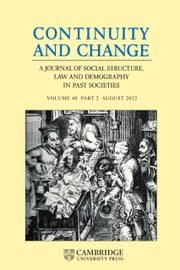Crossref Citations
This article has been cited by the following publications. This list is generated based on data provided by
Crossref.
Botelho, Lynn
2002.
“The old woman's wish”: widows by the family fire?.
The History of the Family,
Vol. 7,
Issue. 1,
p.
59.
Panek, Jennifer
2004.
Widows and Suitors in Early Modern English Comedy.
Sweetinburgh, Sheila
2006.
Strategies of inheritance among Kentish fishing communities in the later Middle Ages.
The History of the Family,
Vol. 11,
Issue. 2,
p.
93.
ZEITLHOFER, HERMANN
2007.
Land, family and the transmission of property in a rural society of South Bohemia, 1651–1840.
Continuity and Change,
Vol. 22,
Issue. 3,
p.
519.
Bennett, Judith M.
2007.
A Companion to Britain in the Later Middle Ages.
p.
87.
Wall, Richard
2007.
Widows and unmarried women as taxpayers in England before 1800.
The History of the Family,
Vol. 12,
Issue. 4,
p.
250.
van der Heijden, Manon
Schmidt, Ariadne
and
Wall, Richard
2007.
Broken families: Economic resources and social networks of women who head families.
The History of the Family,
Vol. 12,
Issue. 4,
p.
223.
Mi Young Lee
2008.
On Ideological Appropriations of the Stereotype of ‘Lusty Widow’ in Renaissance Literary Genres.
Medieval and Early Modern English Studies,
Vol. 16,
Issue. 2,
p.
349.
SPICKSLEY, JUDITH
2008.
Usury legislation, cash, and credit: the development of the female investor in the late Tudor and Stuart periods1.
The Economic History Review,
Vol. 61,
Issue. 2,
p.
277.
Schmidt, Ariadne
2010.
Generous provisions or legitimate shares? Widows and the transfer of property in 17th-century Holland.
The History of the Family,
Vol. 15,
Issue. 1,
p.
13.
Wall, Richard
2010.
Bequests to widows and their property in early modern England.
The History of the Family,
Vol. 15,
Issue. 3,
p.
222.
Dronzek, Anna
2010.
Women and Wealth in Late Medieval Europe.
p.
187.
VAN BAVEL, BAS
DIJKMAN, JESSICA
KUIJPERS, ERIKA
and
ZUIJDERDUIJN, JACO
2012.
The organisation of markets as a key factor in the rise of Holland from the fourteenth to the sixteenth century: a test case for an institutional approach.
Continuity and Change,
Vol. 27,
Issue. 3,
p.
347.
Kelly, Morgan
and
Ó Gráda, Cormac
2012.
The Preventive Check in Medieval and Preindustrial England.
The Journal of Economic History,
Vol. 72,
Issue. 4,
p.
1015.
Whittle, Jane
2014.
Enterprising widows and active wives: women's unpaid work in the household economy of early modern England.
The History of the Family,
Vol. 19,
Issue. 3,
p.
283.
Warner, Lyndan
2016.
Stepfamilies in Early Modern Europe: Paths of Historical Inquiry.
History Compass,
Vol. 14,
Issue. 10,
p.
480.
BARDYN, ANDREA
2018.
The gender distribution of real property ownership in late medieval Brussels (1356–1460).
Continuity and Change,
Vol. 33,
Issue. 1,
p.
29.
ASTON, JENNIFER
CAPERN, AMANDA
and
MCDONAGH, BRIONY
2019.
More than bricks and mortar: female property ownership as economic strategy in mid-nineteenth-century urban England.
Urban History,
Vol. 46,
Issue. 04,
p.
695.
Shepard, Alexandra
and
Stretton, Tim
2019.
Women Negotiating the Boundaries of Justice in Britain, 1300–1700: An Introduction.
Journal of British Studies,
Vol. 58,
Issue. 4,
p.
677.
Vervaet, Lies
2019.
Women and leasehold in rural Flanders, c. 1290 to c. 1570.
Rural History,
Vol. 30,
Issue. 1,
p.
1.


